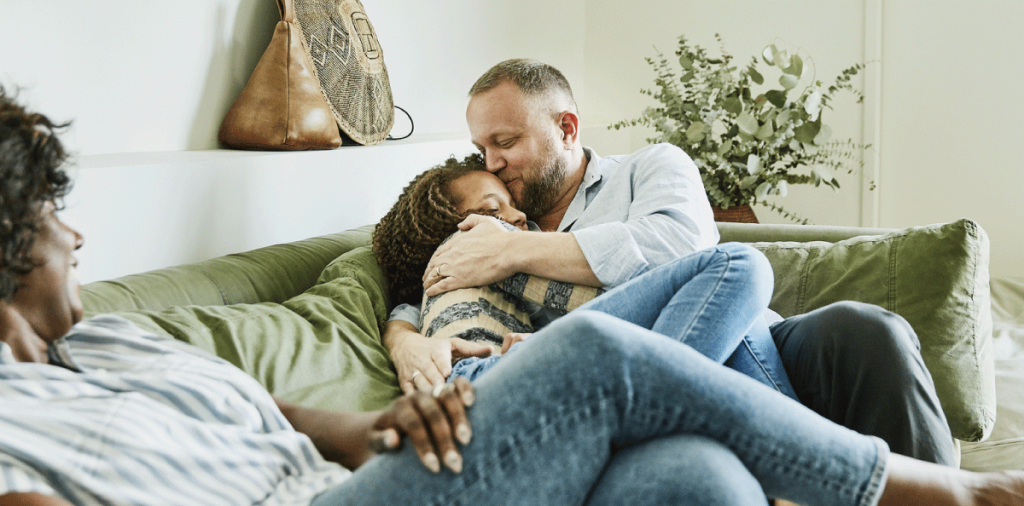How to Help Your Teenager Through a Breakup

Breakups are hard. For adolescents, that first breakup can be a very emotional experience. Parents can find themselves struggling to provide the appropriate response. Being present to support their heartbroken teen is a good start, even if the child appears resistant.
“The more your teenager pushes you away, the more they really need you to come closer,” said Dr. LaToya Flowers-Roe, Clinical Training Director and Director of Diversity, Equity, and Inclusion at The Family Institute at Northwestern University.
Adolescents can learn many things from romantic relationships, including communication and empathy skills. But, while good relationships can make them feel happy and confident, not all relationships last. When breakups occur, they may have significant emotional effects that require attention.
What Are the Mental Health Effects of Teenage Breakups?
The end of a romance can affect teenagers differently. Dr. Flowers-Roe highlighted two major factors that can have an effect on an adolescent’s mental health when experiencing a breakup:
The quality of the relationship.
Time and emotional investment matter.
“Was it a two-week romance versus a longer-term relationship that lasted a few months? When we’re talking about teens, the duration of ‘longer-term’ is much shorter than what we may think as adults.”
How young is the adolescent?
Physiology and physical development matter.
“The impact of heartbreak is going to be more severe [for adolescents] than it is for adults whose cognitive and emotional brains have connected. Those connections are still forming in teens. In some ways, if a younger teen has been engaged in a more serious relationship, then the mental health impacts could be more prominent.”
Breakups can also impact attachment styles, or the ways people treat relationships and interact with others, potentially changing how they approach future relationships. People initially form attachment styles based on the interactions they have at a young age with their parents or guardians. Based on John Bowlby and Mary Ainsworth’s work on attachment theory (PDF, 2.2 MB), there are two categories of styles: secure and insecure.
If a child consistently receives support and attention from a caregiver, they are likely to develop a secure attachment style. Teens with this attachment style typically can cope better with heartbreak. When going through a breakup, those with a secure attachment style may continue to have self-confidence and positive interactions with other people. They may remain open to connecting with others and building relationships.
The insecure attachment style consists of three subsets: avoidant, anxious, and disorganized.
Dr. Flowers-Roe described how adolescents with insecure attachment styles may behave when experiencing a breakup:

Avoidant
They show distrust and increased self-reliance. They are more withdrawn, guarded about their emotions, and hesitant to share with others.

Anxious
They express self-doubt and low self-esteem. They question what they did wrong and what to do next, feeling a need to be perfect to have a relationship.

Disorganized
They are unpredictable. They appear secure and confident, but they can unexpectedly become anxious with others.
Dr. Flowers-Roe emphasized that because attachment styles are changeable, a relationship that introduces a new, significant attachment figure can have serious implications for adolescents as a romance develops or if there is a breakup.
“A teen could go from having a secure attachment because things with Mom and Dad were pretty reliable, and they get in this rocky relationship. Now they’ve developed an anxious or avoidant attachment style,” she said.
Compounding Factors
In addition to attachment styles, the method of ending a relationship also can have an impact on teens.
“What we do know is that face-to-face interactions where you can read someone’s nonverbal cues tend to be correlated with a feeling of more positive support in any situation,” Dr. Flowers-Roe said. “It is a pretty good hypothesis that the less personal, the more harmful that type of breakup can be.”
Sending a text message, having a friend break the news, and changing relationship status on social media without notice are very impersonal methods of communication for people who were in a close relationship. Impersonal methods like these may prompt a negative reaction.
She added that because long-distance relationships often can involve texting or emails, ending a relationship using those methods might be considered acceptable to those involved. If a teen wants to stop meeting after one study date, a quick note might suffice. But there is one method that can be considered the most harmful, according to Dr. Flowers-Roe.
“Ghosting has got to hurt because there’s little opportunity for closure.”
What Are Signs Teens Are Struggling With Their First Heartbreak?
Even the most respectful and considerate breakups can hurt, especially when it’s the first time a teen has experienced the end of a relationship. The heartbreak can be undeniable.
“The signs are going to be pretty close to signs of depression because that breakup, no matter who it is, is going to signal or trigger a down mood,” Dr. Flowers-Roe said.
She highlighted these warning signs for parents to look for in their teens:
Withdrawal from friends, family, and favorite activities.
Are they isolating themselves and avoiding others?
Sudden shift in social circle.
Are they avoiding old friends and hanging out with different people?
Increase or decrease in time spent online.
Are they involved in risky online behavior or being subjected to bullying?
More instances of crying or anger.
Are they displaying emotional symptoms of depression?
Change in school performance.
Has there been a significant and unexpected decline in their grades?
Change in eating habits.
Have they stopped eating or reduced their meal times? Are they binge eating?
Change in sleeping routine.
Are they exhausted or avoiding people and activities by sleeping too much? Are they having trouble falling or staying asleep?
Adolescents should be monitored for these warning signs. Depending on the severity of the effects of a breakup, professional intervention could be helpful for a teen, Dr. Flowers-Roe said.
Ways to Support a Teen Who Is Dealing With a Breakup
Teens might reject offers of help by getting angry, but that doesn’t mean parents and friends should walk away.
“Oftentimes when people are really going through it, it is a distress signal,” Dr. Flowers-Roe explained. “It’s kind of like our Bat-Signal that emotional needs aren’t being met.”
She suggested some ways to support adolescents who are experiencing heartbreak:
Be available.
Let them know that you are around if they need to talk or just be with someone in the same room.
Don’t minimize the loss.
Remember that heartbreak is comparable to physical pain, so avoid saying things like “just get over it.”
Respond in a way to help them feel loved.
Sit quietly and watch a movie together, order their favorite food, take a nature walk, etc.
Look for nonverbal cues.
If they look like they need a hug, give a hug; if they signal they need to be alone, give them space.
Allow for more time with friends.
They might be more inclined to express their feelings to peers, so consider extending their curfew by 30 minutes.
Get professional help.
If the adolescent has been struggling for a while after a breakup, a professional counselor can be helpful.
Active listening is the most important way that counselors can help a teen cope with a breakup.
“I am going to tune in just to you,” Dr. Flowers-Roe said. “I’m just going to pay attention to everything you’re saying, and I’m going to just try to understand what it must be like to be you right now. I’m going to avoid rushing to solve the problem, which is hard for parents because we want to stop the pain.”
She emphasized that active listening shows empathy, which can be the best strategic move to support someone who is feeling pain from a breakup.
Parents may also find success by trying to relate to their child. They can share their first experience with heartbreak, which lets adolescents know that their feelings are valid.
“Normalize the experience,” Dr. Flowers-Roe said. “If you take a risk on love, you’re going to take a risk on breakups, and that’s OK.”
More Resources on How to Cope With a Breakup
Another way to help someone whose relationship has ended is to have resources handy to refer to and to share. Here are some:
- 7 Ways to Help Your Teen With a Broken Heart, Cincinnati Children’s Blog: suggestions from the Cincinnati Children’s Hospital Medical Center for how to support teens experiencing a breakup.
- Breaking Up Is Hard to Do: 5 Tips for Helping Your Teen Navigate Their First Breakup, Nationwide Children’s Hospital: lessons for adolescents to use in future relationships.
- Helping Your Teenager to Date Responsibly, American Counseling Association (ACA) Counseling Corner Blog: steps to make dating a better experience for your teen.
- How to Break Up Respectfully (for Teens), Nemours KidsHealth: tips on how to minimize the negative impact of ending a relationship.
- How to Help Your Teen Deal With a Breakup, First Things First: advice for parents about what to do and what not to do from a nonprofit organization focused on providing relationship resources.
- How to Talk to Your Kids About Their First Heartbreak, Children’s Mercy Kansas City: factors to consider when trying to help your teen get through a breakup.
- The Painful Truth About Breakups, The JED Foundation: discussion about the emotional reactions to a breakup, recognizing them, and validating those feelings.
- Relationship Management, Counseling Today: suggestions for building relationships and taking a chance on romance.
- The Trauma Felt in Teen Breakups, MGH Clay Center for Young Healthy Minds: tips on how to acknowledge a teenager’s pain as they go through a breakup.
- Your Child’s First Crush, HealthyChildren.org: types of relationships children have at different ages with their peers, including teen romance, from the American Academy of Pediatrics.
Citation for this content: Counseling@Northwestern, the online Master of Arts in Counseling program from The Family Institute at Northwestern University.

